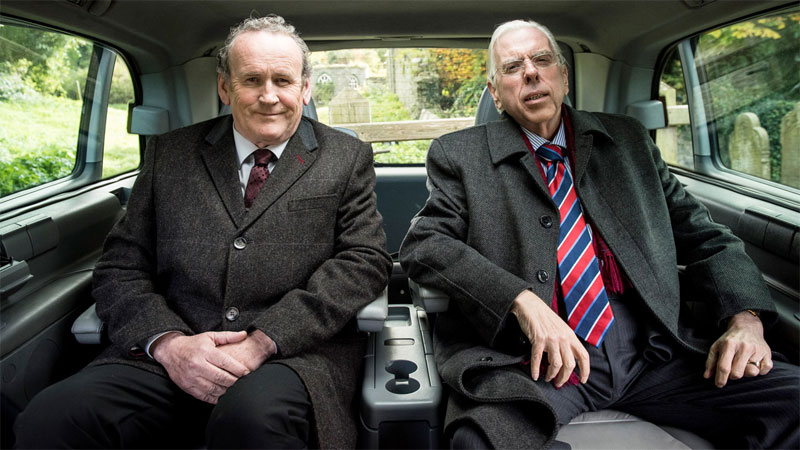Time for a bit of historical contest here!
Northern Ireland
conflict is the name for a series of riots that took place in Northern Ireland
between the end of the 60s and the end of the 90s. Since Northern Ireland was
(is) part of the UK, the official religion was Protestantism while the Catholic
minority was discriminated against. That (and the fact that Catholics were unable to
win political elections) was the spark that lightened the riots. From peaceful
demonstrations to real acts of terrorism and England’s iron fist, this conflict spread
throughout 3 decades.
The movie I’m about to review is the fictionalized story of
the real peace talks between Sinn Fein (independent movement) leader Martin
McGuiness and Democratic Party leader Ian Paisley, who were forced to travel by
car together to reach Edinburgh airport.
Ian Paisley is with his staff in St.Andrews, Scotland, and
so is his political opponent Martin McGuiness. British Prime Minister Tony Blair
and Ireland’s Premier Bertie Ahern are there as well.
In the movie, these talks don't even happen because Ian Paisley has to leave to catch a flight back to Belfast, where he will celebrate his 50 years of marriage party. Martin McGuinness (former IRA leader) doesn't want to be played like a fool and joins Paisley in the car ride to the airport. Jack is their driver, who happens to be more than a simple chauffeur: he's an undercover British agent, constantly in contact with his direct superior and Blair.


At the beginning, Paisley is visibly irritated and hardly acknowledges
McGuiness's presence, but that doesn’t stop chatty Martin from speaking his mind,
whether it’s about nonsense or his political opinions and hopes. Paisley starts
to talk to him, but he’s not very reasonable and keeps on referring to McGuiness as a terrorist and even mocks him when he wants to make amends for the wrongs he has
done. Both of them are intelligent men and their arguments show their love
for their people, so in the end, they find a way to get “along”…or at least, to
avoid getting on each other’s throat!
My Opinion👍👎
Actors here have no option other than being fascinating and charismatic, not only because the characters they're portraying require it, but especially because 85% of the set consists of closed spaces (in this case, the car's interiors).
Honestly, I found John Hurt's speeches to the driver useless: they should have made Jack understand the historical importance of that journey, yet they added nothing if not minutes to the movie.
Honestly, I found John Hurt's speeches to the driver useless: they should have made Jack understand the historical importance of that journey, yet they added nothing if not minutes to the movie.
That said, I liked this movie and I recommend it to everybody! The aerial shots were few but suggestive and Timothy Spall and Colm Meaney were the perfect cast choices.
It's hard to say how much is fiction and how much is real facts, but the spectator can sense the tension between the political parts and the common dislike (not to say genuine hate) between both politicians.
It's hard to say how much is fiction and how much is real facts, but the spectator can sense the tension between the political parts and the common dislike (not to say genuine hate) between both politicians.
Would I pay for the full-price ticket? I'm not 100% sure about the full price, but the discount is totally worth it!
Ranking: 3½/5
Ranking: 3½/5
Related Movies:
Michael Collin (1996) with Liam Neeson, Julia Roberts, Aidan Quinn, Ian Hart, Brendan Gleeson and Alan Rickman.
Bloody Sunday (2002) with James Nesbitt, Allan Gildea, Gerard Crossan, and Mary Moulds.
Hunger (2008 - my review HERE) with Micheal Fassbender, Liam Cunningham, Stuard Graham, and Brian Milligan.
'71 (2014) with Jack O'Connell, Valene Kane, David Wilmot and Sam Reid.
Photo credits: impawards.com, mymovies.it & ilgiornale.it








No comments
Note: Only a member of this blog may post a comment.